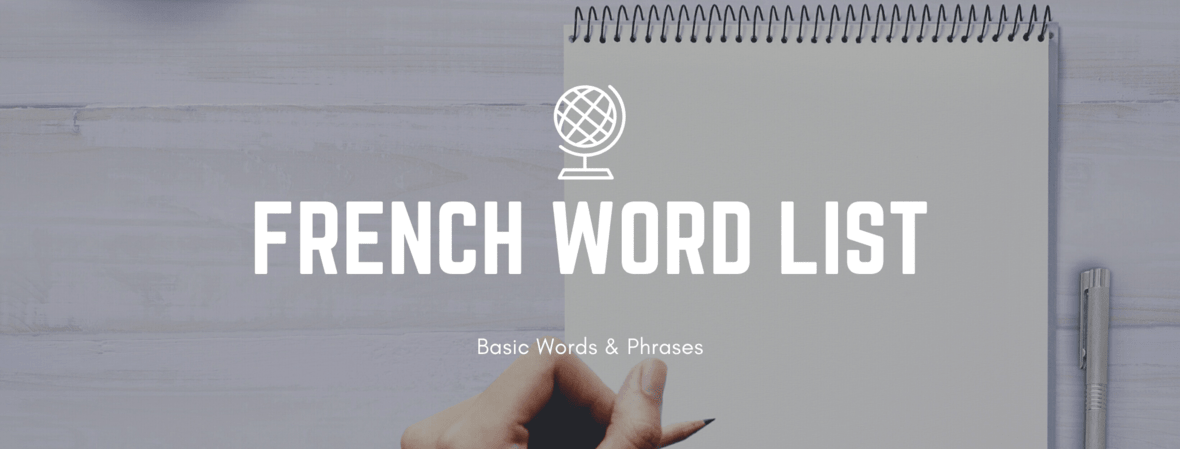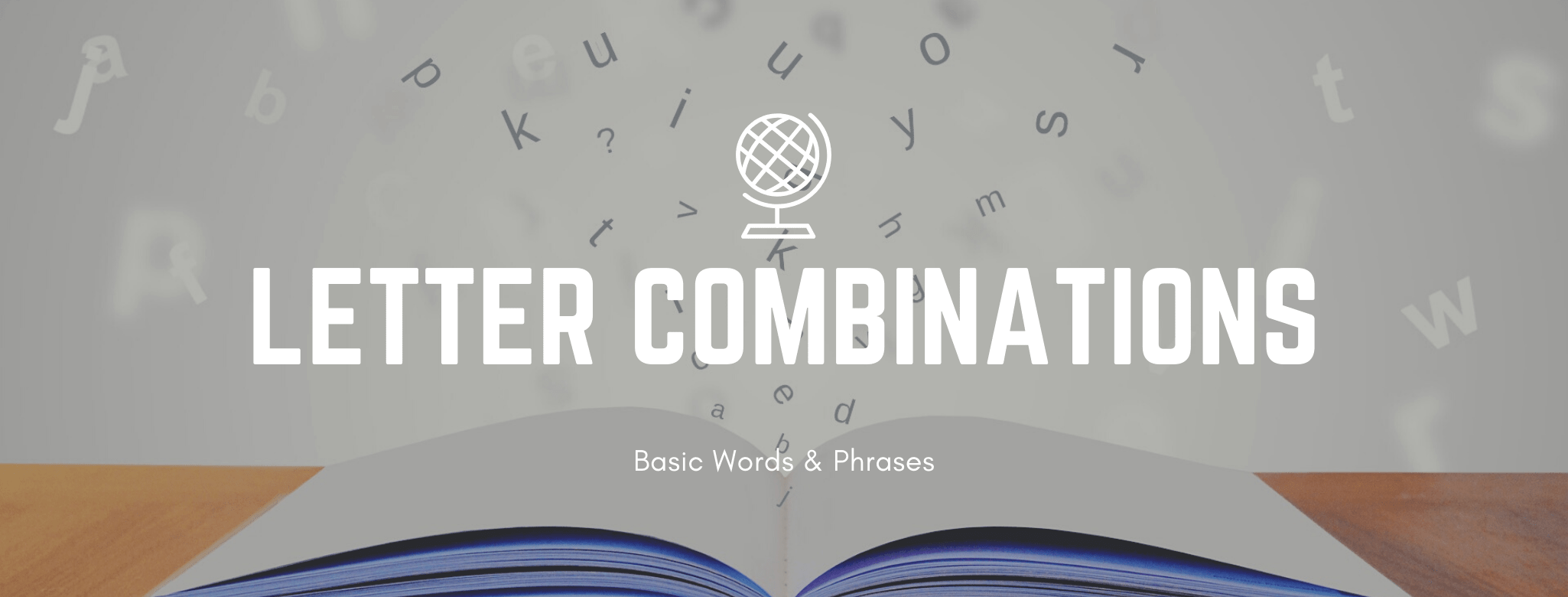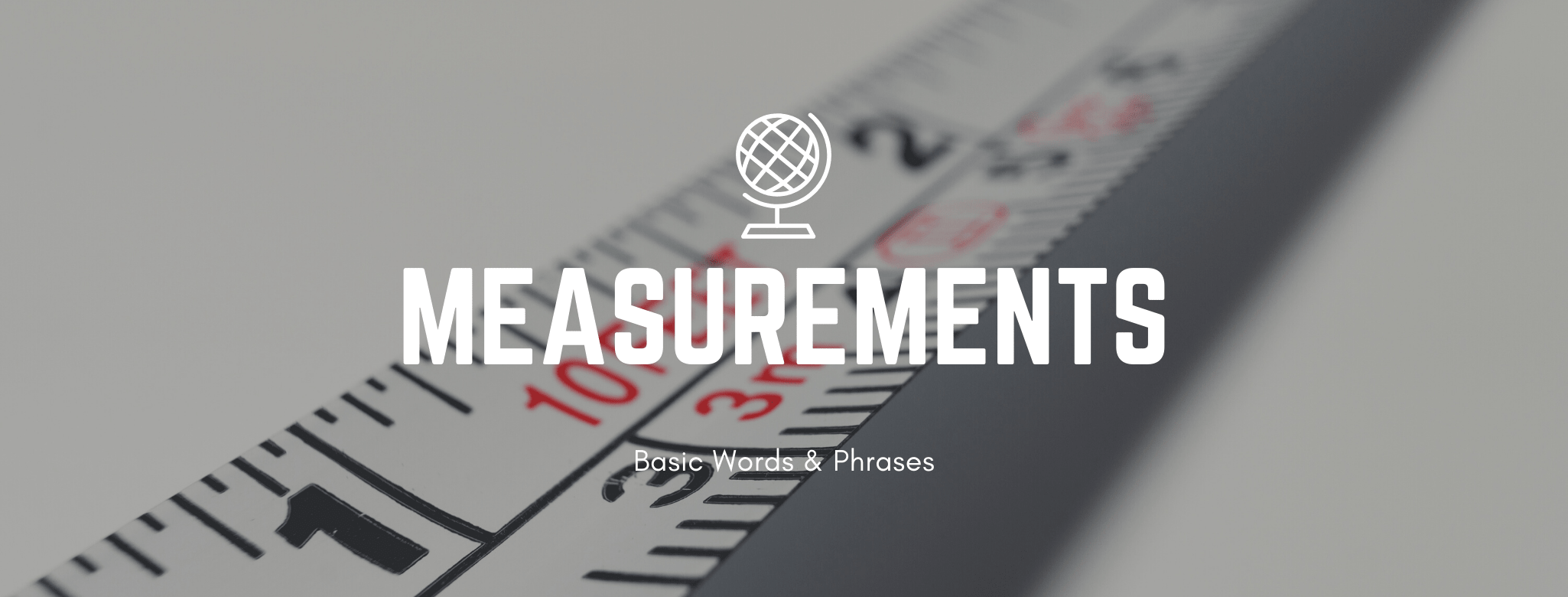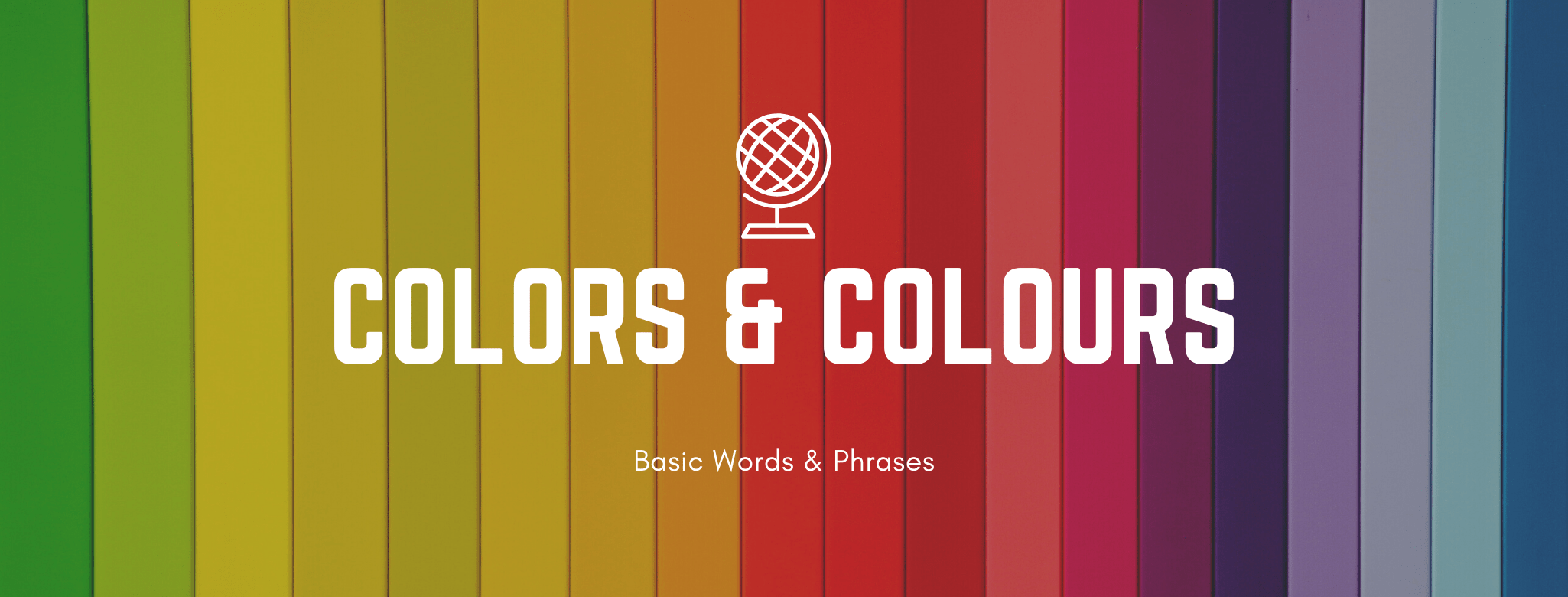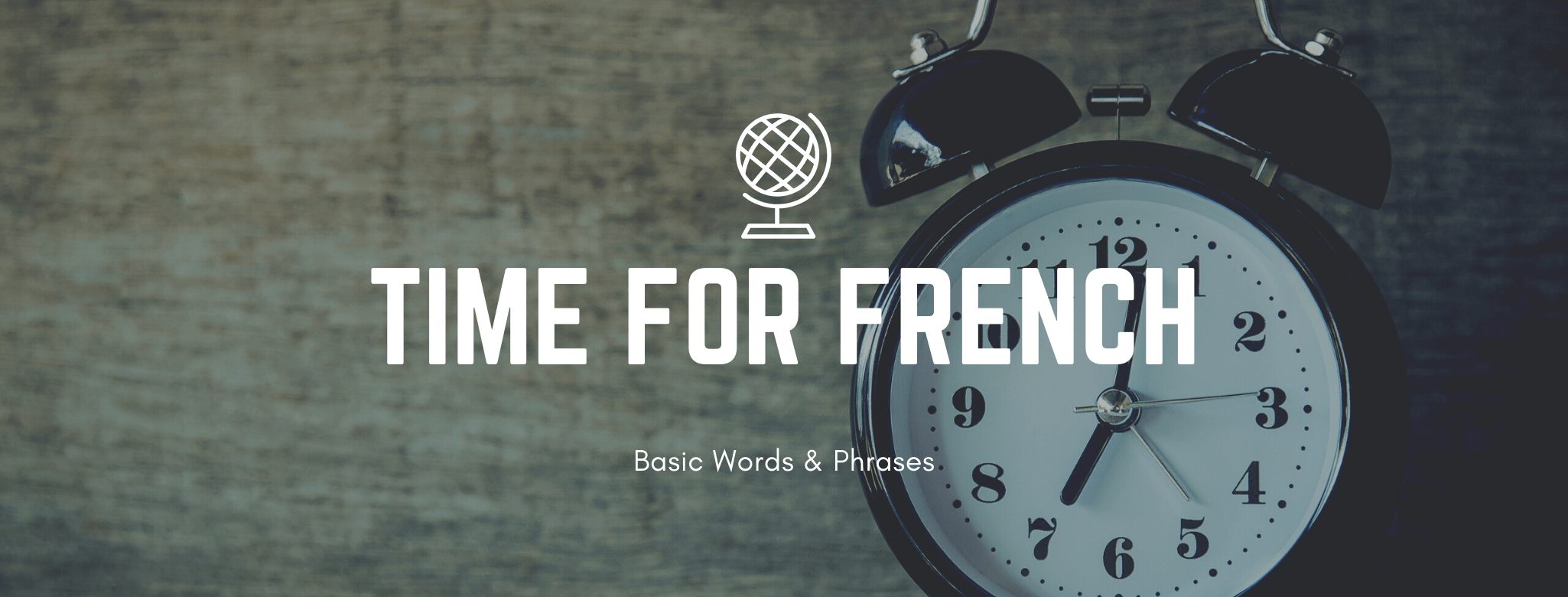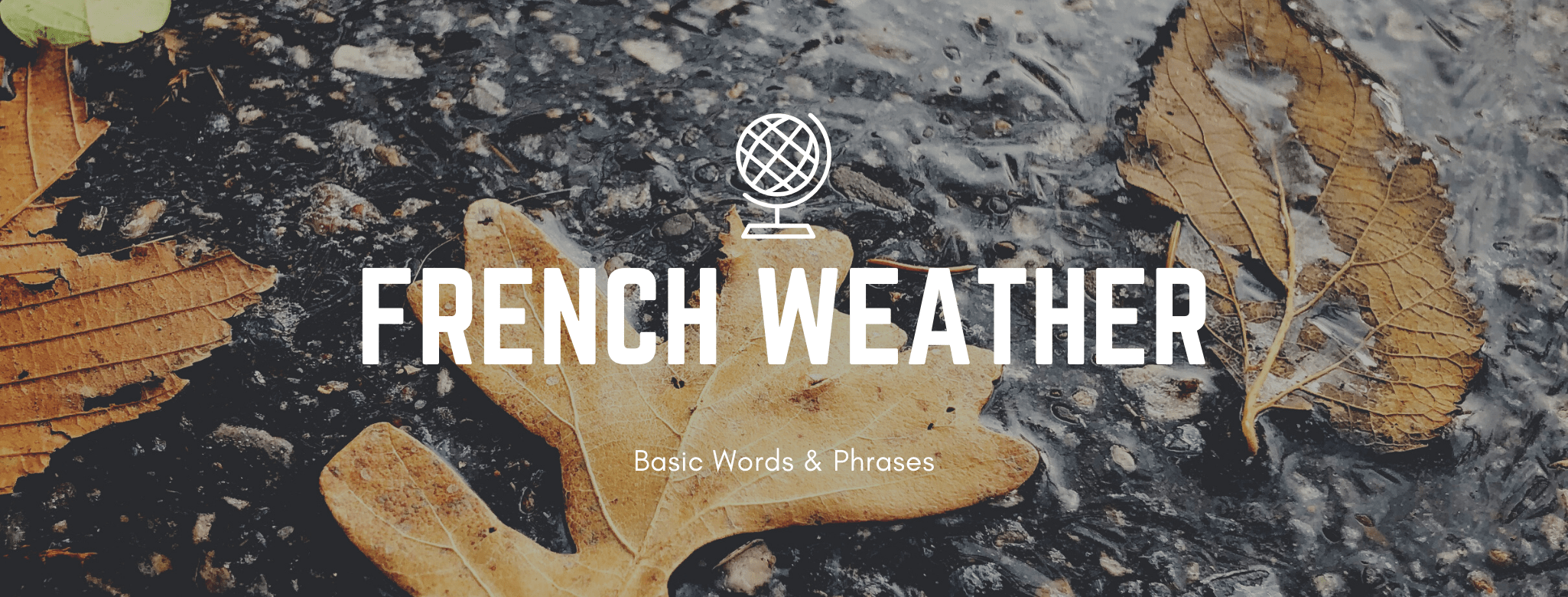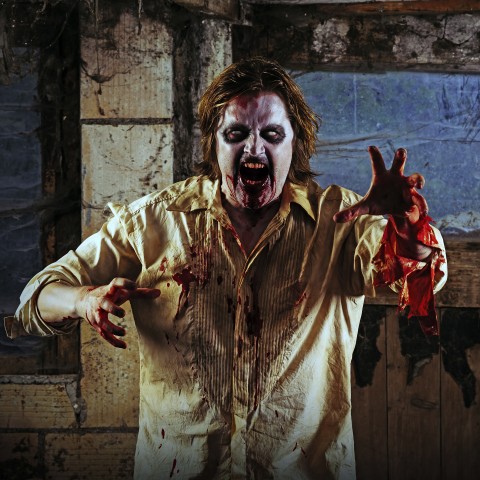
By
Last updated:
March 10, 2023
Learning vocabulary is one of the cornerstones of learning French.
By knowing the most common vocabulary, you’ll get better at everyday communication—which gets you closer to interacting with some of the 300 million people who speak French around the world.
In this post, we’ll get you started with more than 250 easy and common French words!
You’ll be well on your way to having a solid base in the French language in no time.
Contents
- Most Common French Words
- Important French Verbs
- French Question Words
- French Household Words
- French Words for Food & Drinks
- French Words for School or Work
- French Words for Making Descriptions
- French Words for Animals & Nature
Download:
This blog post is available as a convenient and portable PDF that you
can take anywhere.
Click here to get a copy. (Download)
Most Common French Words
Let’s start with some essential vocabulary that you’ll end up using a lot in French conversations:
- Bonjour ! — Hello / Good morning!
- Bonsoir ! — Good evening!
- Oui — Yes
- Non — No
- Excusez-moi — Excuse me
- Je suis désolé / Je suis désolée — I’m sorry (with an extra e if you’re female)
- S’il vous plaît — Please
- Merci — Thank you
- À bientôt — See you soon
- Bonne soirée — Good night (when saying goodbye)
- Bonne nuit — Good night (when you’re about to sleep)
- Au revoir — Goodbye
Important French Verbs
Aside from the conversational words and phrases above, you’ve also got to know the absolute most common French verbs:
- Être — to be
- Avoir — to have
- Aller — to go
These verbs are irregular, meaning they don’t follow the same rules of usage (or conjugation) that so-called regular verbs do.
Most French verbs are regular, meaning you only have to learn the endings of their group.
In French, there are three groups of so-called regular verbs, denoted by their infinitive (unconjugated) endings: -er verbs, -ir verbs and -re verbs.
Here are the most common verbs in each group:
-Er Verbs
- Parler — to speak
- Aimer — to like
- Chanter — to sing
- Danser — to dance
- Fermer — to close
- Demander — to ask
- Étudier — to study
- Regarder — to watch
- Visiter — to visit (a place)
- Habiter — to live
- Jouer — to play
- Laver — to wash
- Penser — to think
- Utiliser — to use
- Trouver — to find
- Manger — to eat
-Ir Verbs
- Finir — to finish
- Bâtir — to build
- Choisir — to choose
- Remplir — to fill
- Grandir — to grow
- Grossir — to gain weight
- Obéir — to obey
- Punir — to punish
- Réfléchir — to reflect
- Réussir — to succeed / pass (a test)
-Re Verbs
- Vendre — to sell
- Attendre — to wait
- Détendre — to relax
- Entendre — to hear
- Fondre — to melt
- Descendre — to go down / descend
- Pendre — to hang
- Perdre — to lose
- Prétendre — to claim
- Répondre — to respond
With all these different kinds of verbs, it’s handy to have a verb conjugation tool, like the one from Reverso.
Another option is to study these verbs in action with FluentU, which features authentic French videos with interactive subtitles. Click on any French verb or other word used in the video to see its definition, along with grammar notes and examples.
You can then add new words to flashcards and take personalized quizzes to grow your French vocabulary.
The language learning program is also available on iOS and Android, so you can take your French study with you wherever you go.
French Question Words
Looking for directions? Do you want to know the price of something?
Whatever you do on your trip to France, you’re definitely going to need to ask for help or direction at some point.
Here are some common expressions to help you get around:
- Où ? — Where?
- Qui ? — Who?
- Quoi ? — What?
- Quand ? — When?
- Comment ? — How?
- Pourquoi ? — Why?
- Combien ? — How much? / How many?
Of course, the beauty of learning language is to be able to communicate with native speakers, which means people might also ask you questions!
Key phrases:
- Comment vous appelez-vous ? — What’s your name?
- Je m’appelle… — I’m called…
- Quel âge avez-vous ? — How old are you?
- J’ai…ans — I’m… years old
- Vous venez d’où ? — Where are you from?
- Je suis… — I am…
des États-Unis — from the United States
du Royaume-Uni — from the United Kingdom
d’Espagne — from Spain
d’Allemagne — from Germany
du Canada — from Canada
d’Australie — from Australia
Are you from a country that’s not included on this list? Take a look at this map of the world to learn your country’s name.
French Household Words
It’s crucial to learn the French words that describe the places where we live.
Check out the following common words that denote specific rooms and spaces in our households.
- La maison — the house
- La salle — the room
- La cuisine — the kitchen
- La salle à manger — the dining room
- Le bureau — the office
- Le salon — the living room
- La chambre — the bedroom
- La salle de bain — the bathroom (may not include a toilet)
- Les toilettes — the bathroom (includes a toilet, sometimes exclusively)
- Le sous-sol — the basement
- Le grenier — attic
- La porte — the door
- La fenêtre — the window
- Le couloir — the hall
- L’escalier — the stairs
- Le mur — the wall
- Le sol — the floor
- Le plafond — the ceiling
Common words associated with rooms in the house:
- Le bureau — the desk
- L’ordinateur — the computer
- L’étagère — the bookshelf
- Le livre — the book
- La télévision — the television
- Le canapé / Le sofa — the couch
- La chaise — the chair
- La lampe — the lamp
- Le rideau — the curtain
- Le réfrigérateur — the fridge
- Le four — the oven
- La cuisinière — the stove
- L’évier — the sink
- La table — the table
- Le lit — the bed
- L’oreiller — the pillow
- La commode — the dresser
- L’horloge — the clock
- La baignoire — the bathtub
- La douche — the shower
- Les toilettes — the toilet
- La brosse à dents — the toothbrush
- Le dentifrice — the toothpaste
- Le tapis — the rug
- Le miroir — the mirror
- Le téléphone — the telephone
French Words for Food & Drinks
Hungry or thirsty? Check out the most common French words for food and drinks.
- Le restaurant — the restaurant
- Le café — the cafe / coffee
- Le thé — the tea
- Le jus — the juice
- Le lait — the milk
- Le vin — the wine
- La bière — the beer
- L’eau — water
- Le fruit — the fruit
- La pomme — the apple
- La banane — the banana
- L’orange — the orange
- La fraise — the strawberry
- Le raisin — the grape
- Les légumes — the vegetables
- La salade — the salad
- La carotte — the carrot
- La pomme de terre — the potato
- La tomate — the tomato
- La laitue — lettuce
- Le champignon — mushroom
- La viande — meat
- Le poisson — fish
- Le poulet — chicken
- Le bœuf — beef
- Le petit-déjeuner — breakfast
- Le déjeuner — lunch
- Le dîner — dinner
- Le repas — the meal
- Le goûter — the snack
- L’assiette — the plate
- Le couteau — the knife
- La fourchette — the fork
- La cuillère — the spoon
- La tasse — the cup
French Words for School or Work
Headed to a French-speaking region for employment or to study? Then the following words are essential!
- L’école — the school
- Le crayon — the pencil
- Le stylo — the pen
- Le cahier — the notebook
- La salle de classe — the classroom
- La calculatrice — the calculator
- La matière scolaire — the school subject
- L’histoire — history
- La géographie — geography
- La musique — music
- Les sciences — the sciences
- Les mathématiques — mathematics
- Le sport — sports
- Le français — French
- L’anglais — English
- Les notes — grades (marks)
- Le professeur / la professeure — the teacher
- L’étudiant(e) / L’élève — the student
The following are common words associated with jobs and work:
- L’entreprise — the company
- L’emploi — the job
- Le travail — the work
- Le dentiste — the dentist
- L’écrivain — the writer
- Le médecin — the doctor (medical)
- Le serveur / la serveuse — the waiter / waitress
- L’avocat — the lawyer
- Le caissier / la caissière — the cashier
- L’ingénieur(e) — the engineer
- Le mécanicien / la mécanicienne — the mechanic
- Le plombier / la plombière — the plumber
- Le pompier / la pompière — the firefighter
- Le policier / la policière — the police officer
- L’architecte — the architect
- Le travailleur / la travailleuse — the worker
- Le boulanger / la boulangère — the baker
- Le boucher / la bouchère — the butcher
- Le coiffeur / la coiffeuse — the hairdresser
French Words for Making Descriptions
The following are common words that can be used to describe yourself, others or inanimate things.
- Grand(e) — big
- Petit(e) — small
- Chaud(e) — hot
- Froid(e) — cold
- Intelligent(e) — smart
- Fâché(e) — angry
- Triste — sad
- Heureux / heureuse — happy
- Drôle — funny
- Jeune — young
- Vieux / vieille — old
- Nerveux / nerveuse — nervous
- Beau / belle — beautiful
- Facile — easy
- Difficile — hard
- Effrayé(e) — scared
- Ennuyé(e) — bored
- Ennuyeux / ennuyeuse — boring
- Étrange — strange
- Fort(e) — strong
- Possible — possible
- Impossible — impossible
- Sportif / sportive — athletic
Keep in mind that some adjectives change genders depending on the gender of the noun it describes.
In this list, the masculine forms are given first, with the feminine forms being either those with an added -e or the second form of the adjective.
Interested in more adjectives? Check out how to say common colors in French as well!
French Words for Animals & Nature
The following are common French words that can be used to describe animals or nature.
- Le chien — the dog
- Le chat — the cat
- Le lapin — the rabbit
- Le lion — the lion
- Le cheval — the horse
- La vache — the cow
- Le requin — the shark
- Le singe — the monkey
- Le cochon — the pig
- L’oiseau — the bird
- La souris — the mouse
- La tortue — the turtle
- Un canard — the duck
- Un crapaud — the toad
- Une grenouille — the frog
- Le soleil — the sun
- La pluie — the rain
- Le vent — the wind
- La neige — the snow
- Le nuage — the cloud
- L’éclair — the lightning
- Le tonnerre — the thunder
- L’orage — the storm
- La montagne — the mountain
- La plage — the beach
- La forêt — the forest
- La terre — soil / the earth
- La colline — the hill
- Le lac — the lake
- L’océan — the ocean
- La météo — the weather forecast
- Quel temps fait-il ? — What’s the weather?
- Il fait chaud — It is hot
- Il fait froid — It is cold
And just like that, you have 250+ words to bring your French to the next level. Practice these words often and watch your French comprehension and production vastly improve!
Bonne chance ! (Good luck!)
Download:
This blog post is available as a convenient and portable PDF that you
can take anywhere.
Click here to get a copy. (Download)
From please and thank you to good morning and good night you’ll have what you need to be polite and win a smile for trying.
French word list for everyday conversation
Here’s a list of common French phrases that will help you communicate whilst travelling in France. Your trip will be much more enjoyable if you have a basic French vocabulary and the locals will appreciate your efforts.
{{ item.english }}
{{ item.translation }}
How to pronounce letter combinations
The following examples show you how to pronounce French letter combinations. The italic examples are the English equivalents.
Measurement Translations
{{ item.english }}
{{ item.translation }}
Colors (US) / Colours (UK)
The below English French translations show a list of colors and there pronunciation with links to French lessons by Lya and FrenchPod101. You can watch all the French videos here: French Colors | Tutorial Videos.
{{ item.english }}
{{ item.translation }}
-
-
Learn French — French Color Vocabulary
2 minutes 43 second tutorial
FrenchPod101 have also created this great French colors vocabulary lesson which shows you how to say 17 colors with pictures.
Time to talk
At some point you will need to know the time or will be asked for the time. These words & phrases will teach you the basics and the lessons below will have you conversing in no time!
{{ item.english }}
{{ item.translation }}
-
What Time Is It? — part 1
10 minutes 31 seconds tutorial
Words & phrases for telling the time
Join Alexa in «What Time Is It? — part 1». Alexa will teach you the basics about how to tell time in French.
-
What Time Is It? — part 2
14 minutes 5 second tutorial
Time Pronunciation
Once you have learnt the basics you can move on a more difficult lesson «What Time Is It? — part 2». Alexa will now show you how to build a sentence for telling the time.
-
Choosing a Delivery Time in France
2 minutes 14 second listening exercise
French Listening Exercise
Now that you have learnt some vocabulary, how about testing yourself with this listening exercise.
Words you may use when talking about the weather
{{ item.english }}
{{ item.translation }}
Free French Lessons
Here are 30 French language lessons that teach you basic french words & phrases.
Do you know how many words there are in the French language? Come on, have a guess.
Most French dictionaries list around 60,000. But Le Grand Robert, one of the most prominent resources, gathers more than 100,000 words for a total of 350,000 different meanings.
Sounds overwhelming? Keep in mind that even native French speakers know merely a fraction of that! To start having basic conversations, you only need a few hundred basic French words for beginners.
Further down the line, you’ll be considered “proficient” in French upon reaching around 5,000 words. That’s only about 5% of the whole collection.
But let’s not get ahead of ourselves! In this article, we’ll list all of the French beginner words that will allow you to handle many everyday situations, whether you want to talk, listen, or both.
You only need a few words to start a conversation and make friends.
Table of Contents
- Pronouns
- Verbs
- Numbers
- Nouns
- Conjunctions
- Adjectives
- Adverbs
- Le mot de la fin
1. Pronouns
Let’s start our list of beginner French words with the most useful pronouns you should learn as you begin your studies.
At first, all you’re gonna need are the personal subject pronouns (“she,” “you,” “we,” and so on). As you move forward, you’ll quickly add some more to your arsenal.
- → To learn all about this topic, from the general rules to the 10 main categories of French pronouns, make sure to visit our complete guide on FrenchPod101.com.
1 – Personal Subject Pronouns
Personal subject pronouns replace the subject of a sentence.
- Sophie parle français. (“Sophie speaks French.”)
- Elle parle français. (“She speaks French.”)
| Person | French pronoun | English |
| 1st person sg. | je, j’ | I |
| 2nd person sg. | tu / vous | you (casual / formal) |
| 3rd person sg. | il, elle, on | he, she, one |
| 1st person pl. | on / nous | we (casual / formal) |
| 2nd person pl. | vous | you |
| 3rd person pl. | Ils, elles | they |
2 – Impersonal Pronouns
When a sentence doesn’t have a clear subject, let’s stay vague and impersonal:
ça, ce, c’ (“it”)
- Ça fait mal. (“It hurts.”)
- Ce n’est pas vrai. (“It is not true.”)
- C’est important. (“It is important.”)
il (“it”)
- Il est temps. (“It’s time.”)
- Il pleut. (“It’s raining.”)
3 – Reflexive Pronouns
Reflexive pronouns are used with reflexive verbs. For example:
- se lever (“to stand up”)
- se promener (“to stroll”)
- s’habiller (“to get dressed”)
| Person | French pronoun | Example |
| 1st person sg. | me, m’ | Je me lève. (“I stand up.”) |
| 2nd person sg. | te, t’ | Tu te lèves. (“You stand up.”) |
| 3rd person sg. | se, s’ | Elle s’habille. (“She gets dressed.”) |
| 1st person pl. | nous | Nous nous préparons. (“We’re getting ready.”) |
| 2nd person pl. | vous | Vous vous rasez. (“You shave.”) |
| 3rd person pl. | se | Ils se promènent. (“They are strolling.”) |
4 – Interrogative Pronouns
- Qui ? (“Who?”)
Qui est là ? (“Who’s there?”)
- Où ? (“Where?”)
Où es-tu ? (“Where are you?”) - Quand ? (“When?”)
On commence quand ? (“When do we start?”)
- Quoi ? (“What?”)
On fait quoi ce soir ? (“What are we doing tonight?”)
- Pourquoi ? (“Why?”)
Pourquoi tu ris ? (“Why are you laughing?”)
5 – Indefinite Pronouns
- tout (“everything”)
- rien (“nothing”)
- quelque chose (“something”)
- tout le monde (“everybody”)
- personne (“nobody”)
- quelqu’un (“somebody”)
Elle se réveille. (“She wakes up.”)
2. Verbs
Here’s a list of the 50 most useful French verbs for beginners. Of course, depending on whether you’re studying, visiting, or working in France, you might have different needs. But this is a good place to start in any case!
- → For all the information you’ll need on regular verb groups (-ER and -IR), irregular verbs, and reflexive verbs, be sure to have a look at our full article on FrenchPod101.com.
| être | to be |
| avoir | to have |
| aller | to go |
| vouloir | to want |
| pouvoir | to be able to / can |
| devoir | to have to / must |
| falloir | to be necessary |
This verb is only conjugated in the third person, with the impersonal pronoun il (“it”). In this case, it means “it is necessary that.”
|
| faire | to do |
| dire | to say / to tell |
| parler | to talk / to speak |
| aimer | to like / to love |
| mettre | to put / to place |
| remettre | to put back |
| poser | to put down / to ask |
| prendre | to take / to catch / to capture |
| donner | to give |
| savoir | to know |
| entendre | to hear |
| voir | to see |
| demander | to ask / to request |
| répondre | to answer / to reply |
| chercher | to look for |
| trouver | to find / to discover |
| retrouver | to regain / to meet up |
| rendre | to return / to give back / to make |
| venir | to come |
| passer | to pass / to go / to come |
| croire | to believe / to think |
| montrer | to show |
| commencer | to begin / to start |
| continuer | to continue / to keep going |
| penser | to think |
| comprendre | to understand / to include |
| rester | to stay / to remain |
| attendre | to wait |
| partir | to leave |
| arriver | to arrive / to happen |
| suivre | to follow |
| revenir | to come back |
| connaître | to know |
| compter | to count |
| permettre | to permit / to allow |
| s’occuper | to take care of |
| sembler | to seem |
| lire | to read |
| écrire | to write |
| devenir | to become / to turn into |
| décider | to decide |
| tenir | to hold |
| porter | to carry / to wear |
Just add a few tenses and you can talk about anything!
3. Numbers
As a beginner, you really won’t need much as far as counting and numbers go. In most situations, you can get by with only small numbers; I’d not go further than 1 to 10 for now.
- → Should you need more digits, you could check out our article on French numbers. You’ll find everything you need to count from zero to infinity! It’s available for free on FrenchPod101.com.
- 0 Zéro
- 1 Un
- 2 Deux
- 3 Trois
- 4 Quatre
- 5 Cinq
- 6 Six
- 7 Sept
- 8 Huit
- 9 Neuf
- 10 Dix
4. Nouns
As a beginner, your basic French vocabulary arsenal should consist of the most common nouns in various categories. Knowing these alone will allow you to communicate basic ideas in a pinch.
French nouns can be masculine or feminine, and you can generally determine which gender a word is based on the ending. However, because you don’t want to think about it in the middle of a conversation or get tricked by exceptions, the best way to learn nouns is to always use the article.
TrainUn train (“A train”)VoitureUne voiture (“A car”)
In the following list, I’ll mention the article for each word. In case the plural is irregular, I will include that as well. For every other word, the general rules apply.
- Un train, des trains (“Train, trains”)
- Une voiture, des voitures (“Car, cars”)
- Un mois, des mois (“Month, months”)
For more information on the gender and plural of French nouns, we just happen to have a detailed article on FrenchPod101.com.
1 – Time
| une heure | an hour |
| une minute | a minute |
| un jour | a day |
| un mois | a month |
| un an / une année | a year |
An is mainly used with numbers, as in:
|
| un lundi | Monday |
| un mardi | Tuesday |
| un mercredi | Wednesday |
| un jeudi | Thursday |
| un vendredi | Friday |
| un samedi | Saturday |
| un dimanche | Sunday |
| un matin | morning |
| un midi | noon |
| un après-midi | afternoon |
| un soir | evening |
| une nuit | night |
2 – Places
| un monde | world |
| un pays | country |
| un endroit | place |
| une mer | sea |
| une forêt | forest |
| une montagne | mountain |
| un magasin | shop |
3 – Technology & Internet
| un téléphone | phone |
| un écran | screen |
| un ordinateur | computer |
| internet | internet |
4 – Home
| une maison | house |
| une porte | door |
| une fenêtre | window |
| une cuisine | kitchen |
| une chambre | bedroom |
| des toilettes | toilets / restroom |
5 – City & Transport
| une voiture | car |
| un bus | bus |
| un train | train |
| un avion | plane |
| un taxi | taxi / cab |
| un vélo | bicycle |
| une ville | city |
| une rue | street |
| une avenue | avenue |
| une route | road |
6 – People
| une mère | mother |
| un père | father |
| Maman | Mom |
| Papa | Dad |
| une femme | woman / wife |
| un homme | man |
| un mari | husband |
| un frère | brother |
| une sœur | sister |
| une famille | family |
| une copine | girlfriend |
| un copain | boyfriend |
| un fils | son |
| une fille | daughter |
| un ami | friend |
7 – Body
| une tête | head |
| un œil / des yeux | eye / eyes |
| une bouche | mouth |
| un nez | nose |
| une oreille | ear |
| des cheveux | hair |
| un bras | arm |
| une main | hand |
8 – Food
| une table | table |
| une assiette | plate |
| un verre | glass |
| de l’eau | water |
| un fruit | fruit |
| un légume | vegetable |
| un café | coffee |
| du pain | bread |
9 – Work & Studies
| un étudiant | student |
| une école | school |
| un docteur | doctor |
| un vendeur | salesman / vendor / seller |
| un professeur | professor |
10 – Conversation
| une question | question |
| une réponse | answer |
| un mot | word |
| une phrase | phrase / sentence |
| une idée | idea |
There is always a bit of time to review vocabulary lists.
5. Conjunctions
There’s a LOT to say and explain about conjunctions, but luckily, you don’t need to use many of them when you start learning French.
- → Later on, though, have a look at our complete guide on French conjunctions to learn everything about how to list things, express conditions, state consequences, and much more.
- et (“and”)
Un chat et un chien (“A cat and a dog”) - ou (“or”)
De l’eau ou du vin (“Water or wine”) - si (“if”)
Si tu veux venir (“If you want to come”)
- parce que (“because”)
Je mange parce que j’ai faim. (“I eat because I’m hungry.”)
- mais (“but”)
Un peu mais pas trop (“A bit, but not too much”)
- pour (“for” / “to” / “so that”)
J’apprends le français pour voyager. (“I learn French to travel.”)
C’est pour toi. (“It’s for you.”)
- par (“by” / “out of” / “with” / “using” / “through”)
Je suis aidé par un expert. (“I’m helped by an expert.”)
Je passe par Paris et Bordeaux. (“I go through Paris and Bordeaux.”)
Un chat et un chien (“A cat and a dog”)
6. Adjectives
French adjectives must agree in gender and number with the noun they describe. In this table, you’ll find both genders in the format [ Masculine – Feminine ], as they can get quite irregular. If you see only one, it just means that the masculine and feminine forms are identical.
Plurals, on the other hand, are rather predictable and follow the general rules of the French plural.
- → You might want to check out a more detailed article on French adjectives for more grammar info and examples.
| bon – bonne | good / right / correct |
| mauvais – mauvaise | bad / wrong / incorrect |
| facile | easy |
| difficile | difficult / hard |
| nouveau – nouvelle | new |
| cher – chère | expensive |
| grand – grande | large / big / tall / great / major |
| gros – grosse | big / fat |
| petit – petite | small / little |
| long – longue | long |
| court – courte | short |
| rapide | fast / quick |
| lent – lente | slow |
| chaud – chaude | hot / warm |
| froid – froide | cold |
| premier – première | first |
| dernier – dernière | last / final / latest |
| même | same |
| autre | other |
| différent – différente | different |
| seul – seule | only / alone / lonely |
| meilleur – meilleure | best / better |
| pire | worst |
| beau – belle | handsome / beautiful |
| moche | ugly |
| fort – forte | strong / high / important |
| gentil – gentille | nice / kind |
| fou – folle | crazy / mad |
| content – contente | glad |
| malade | sick / ill |
| important – importante | important |
| noir – noire | black |
| blanc – blanche | white |
| bleu – bleue | blue |
| rouge | red |
| sucré – sucrée | sweet |
| salé – salée | salty |
| délicieux – délicieuse | delicious |
Cette tarte est délicieuse ! (“This tart is delicious!”)
7. Adverbs
If you need a reminder on what adverbs are, how they’re formed, and where to place them in a sentence, I would recommend a pit stop at our extensive article on French adverbs.
1 – When
| tard | late |
| tôt | early |
| bientôt | soon |
| hier | yesterday |
| aujourd’hui | today |
| demain | tomorrow |
| avant | before |
| après | after |
2 – How Often
| jamais | never |
| trop | too much |
| souvent | often |
| toujours | always |
| peut-être | maybe |
| aussi | as well / too / also |
3 – Where
| ici | here |
| là | there |
| partout | everywhere |
| dedans | inside |
| dehors | outside |
4 – How
| bien | well |
| mal | badly / poorly |
| vite | quickly |
5 – How Much
| vraiment | truly / really |
| tout | all / everything |
| rien | nothing |
| beaucoup | many / much / a lot |
| seulement | only |
| peu | little / few |
| très | very / really |
| plus | more |
| moins | less |
Il a très faim ! (“He’s really hungry!”)
8. Le mot de la fin
In this guide, you’ve learned more than 200 of the most useful French words for beginners: pronouns, verbs, nouns, adjectives, and all that jazz. As you keep learning French, you might find it handy to have them all conveniently gathered in one place.
Can you think of any more words you might need to know as you start your language learning journey? Let us know in the comments and we’ll get back to you!
Make sure to explore FrenchPod101.com, as we have plenty of free resources to help you practice your grammar and learn more basic French words and structures. Our vocabulary lists are another great way to learn and review the pronunciation of new words.
Remember that you can also use our Premium PLUS service, MyTeacher, to get personal 1-on-1 coaching with your own private teacher. They can help you practice with beginner words and more. In addition to providing you with assignments, personalized exercises, and recorded audio samples, your teacher will review your work and help improve your pronunciation.
Happy learning on FrenchPod101!
About the Author: Born and bred in rainy Northern France, Cyril Danon was bouncing off various jobs before he left everything behind to wander around the wonders of the world. Now, after quenching his wanderlust for the last few years, he’s eager to share his passion for languages.

Learn different French words to improve your French vocabulary list. These words are in various categories, which will help you develop a solid base in the French language.
Learning vocabulary is a crucial component of learning any new language. If you are facing difficulties in learning French, start with memorizing different vocabulary words. These words can develop your confidence to speak French in public.
Gradually adding different words to your vocabulary list can improve your command of the French language. Adding different words to speech can also improve your confidence to speak French in public.
When you start learning a new language, you must begin developing your vocabulary list by adding words that define your surroundings. The things available in our immediate surroundings are a great tool to learn French.
If you want to learn French online, get enrolled in italki’s learning lessons. These lessons are organized by the best and most professional French tutors, who will help you improve your French vocabulary, common French verbs, French pronunciation, etc.
Find Your Perfect Teacher
At italki, you can find your French tutor from all qualified and experienced teachers. Now experience the excellent language learning journey!
Book a trial lesson

Let’s start with some of the basic French words that describe the places where we live. These words explain specific rooms and spaces in our households.
- La maison — the house
- La salle — the room
- La cuisine — the kitchen
- La salle à manger — the dining room
- Le bureau — the office
- Le salon — the living room
- La chambre — the bedroom
- La salle de bain — the bathroom (this room may not include a toilet)
- Les toilettes — the bathroom (this room includes a toilet, sometimes exclusively)
- Le sous-sol — the basement
- Le grenier — attic
- La porte — the door
- La fenêtre — the window
- Le couloir — the hall
- L’escalier — the stairs
- Le mur — the wall
- Le sol — the floor
- Le plafond — the ceiling
You can add any of the above words with je suis dans… (I am in…) to complete the sentence. For example: Je vais au sous-sol (I am going to the basement).
French words related to rooms in the house
- Le bureau — the desk
- L’ordinateur — the computer
- L’étagère — the bookshelf
- Le livre — the book
- La télévision — the television
- Le canapé / le sofa — the couch
- La chaise — the chair
- La lampe — the lamp
- Le rideau — the curtain
- Le réfrigérateur — the fridge
- Le four — the oven
- La cuisinière — the stove
- L’évier — the sink
- La table — the table
- Le lit — the bed
- L’oreiller — the pillow
- La commode — the dresser
- L’horloge — the clock
- La douche — the shower
- La toilette — the toilet
- La brosse à dents — the toothbrush
- Le dentifrice — the toothpaste
- Le tapis — the rug
- Le miroir — the mirror
- La téléphone — the telephone
With the object words listed above, you could ask, qu’est-ce que c’est? (What exactly is this?)
Simply begin a phrase with c’est… (it is) and name the object, including its article (le, la, or l’).
Basic French words related to Food & Drinks
Following are some of the basic French words related to food and drinks. No matter if you are hungry or thirsty, you can use these French words to order a drink for you.
- Le restaurant — the restaurant
- Le café — the cafe / coffee
- Le thé — the tea
- Le jus — the juice
- Le lait — the milk
- Le vin — the wine
- La bière — the beer
- L’eau — water
- La fruit — the fruit
- La pomme — the apple
- La banane — the banana
- L’orange — the orange
- La fraise — the strawberry
- Le raisin — the grape
- Les légumes — the vegetables
- La salade — the salad
- La carotte — the carrot
- La pomme-de-terre — the potato
- Le tomate — the tomato
- La laitue — lettuce
- Le champignon — mushroom
- La viande — meat
- Le poisson — fish
- Le poulet — chicken
- Le bœuf — beef
- Le petit-déjeuner — breakfast
- Le déjeuner — lunch
- Le dîner — dinner
- Le repas — meal
- Le goûter — snack
- L’assiette — plate
- Le couteau — knife
- La fourchette — fork
- La cuillère — spoon
- La tasse — cup
You can make French sentences by using these food words. Just use the phrase je mange de… (I am eating…) and add any of the words above to tell others what you are eating.
For drinking, use the phrase je bois de… (I am drinking…) and add any of the words above to tell others what you are drinking.
For example:
- Je mange de la fruit (I eat fruit).
- Je bois du thé (I drink tea).
Vocabulary related to school or work
- L’école — the school
- Le crayon — the pencil
- Le stylo — the pen
- Le cahier — the notebook
- La salle de classe — the classroom
- La calculatrice — the calculator
- La matière scolaire — the school subject
- L’histoire — history
- La géographie — geography
- La musique — music
- Les sciences — the sciences
- Les mathématiques — mathematics
- Le sport — sports
- Le français — French
- L’anglais — English
- Les notes — grades (marks)
- Le professeur / la professeure — the teacher
- L’étudiant(e) / l’élève — the student
French vocabulary related to career
- La compagnie — the company
- L’emploi — the job
- Le travail — the work
- Le dentiste — the dentist
- L’écrivain — the writer
- Le médicin — the doctor (medical)
- Le serveur / la serveuse — the waiter / waitress
- L’avocat — the lawyer
- Le caissier / la caissière — the cashier
- L’ingénieur(e) — the engineer
- Le mécanicien / la mécanicienne — the mechanic
- Le plombier / la plombière — the plumber
- Le pompier / la pompière — the firefighter
- Le policier / la policière — the police officer
- L’architecte — the architect
- Le travailleur / la travailleuse — the worker
- Le boulanger / la boulangère — the baker
- Le boucher / la bouchère — the butcher
- Le coiffeur / la coiffeuse — the hairdresser
For example:
Je suis plombier (I am a plumber).
Vocabulary words related to places
- La ville — the city
- La campagne — the countryside
- La ferme — the farm
- Le parc — the park
- La rivière / le fleuve — the river
- L’arbre — the tree
- La fleur — the flower
- Le bâtiment — the building
- La tour — the tower
- Le bureau de poste — the post office
- La bibliothèque — the library
- La librairie — the bookstore
- La boulangerie — the bakery
- La pharmacie — the pharmacy
- L’hôpital — the hospital
- Le marché / le supermarché — the market / supermarket
- Le cinéma — the movie theatre
- La banque — the bank
- L’église — the church
- Le musée — the museum
- La gare — the train station
- Le trottoir — the sidewalk
- La rue — the street
For example:
Je vais au supermarché (I am going to the supermarket).
French words to describe yourself and other related things
You can use following words to describe yourself and the things around you.
- Grand(e) — big
- Petit(e) — small
- Chaud(e) — hot
- Froid(e) — cold
- Intelligent(e) — smart
- Fâché(e) — angry
- Triste — sad
- Heureux / heureuse — happy
- Drôle — funny
- Jeune — young
- Vieux / vieille — old
- Nerveux / nerveuse — nervous
- Beau / belle — beautiful
- Facile — easy
- Difficile — hard
- Effrayé(e) — scared
- Ennuyé(e) — bored
- Ennuyeux / ennuyeuse — boring
- Étrange — strange
- Fort(e) — strong
- Possible — possible
- Impossible — impossible
- Sportif / sportive — athletic
For example:
La maison est grande (The house is big).
Vocabulary words related to animals and nature
- Le chien — dog
- Le chat — cat
- Le lapin — rabbit
- Le lion — lion
- Le cheval — horse
- La vache — cow
- Le requin — shark
- Le singe — monkey
- Le cochon — pig
- L’oiseau — bird
- La souris — mouse
- La tortue — turtle
- Un canard — duck
- Un crapaud — toad
- Une grenouille — frog
- Le soleil — the sun
- La pluie — the rain
- Le vent — the wind
- La neige — the snow
- Le nuage — the cloud
- L’éclair — the lightning
- La tonnerre — the thunder
- L’orage — the storm
- La montagne — the mountain
- La plage — the beach
- La forêt — the forest
- La terre — soil / the earth
- La colline — the hill
- Le lac — the lake
- L’océan — the ocean
Common French verbs
The most common -er verbs are as follows:
- Parler — to speak
- Aimer — to like
- Chanter — to sing
- Danser — to dance
- Fermer — to close
- Demander — to ask
- Étudier — to study
- Regarder — to watch
- Visiter — to visit (a place)
- Habiter — to live
- Jouer — to play
- Laver — to wash
- Penser — to think
- Utiliser — to use
- Trouver — to find
- Manger — to eat
Common -ir verbs include the following:
- Finir — to finish
- Bâtir — to build
- Choisir — to choose
- Remplir — to fill
- Grandir — to grow
- Grossir — to gain weight
- Obéir — to obey
- Punir — to punish
- Réfléchir — to reflect
- Réussir — to succeed / pass
Here are the most common -re verbs:
- Vendre — to sell
- Attendre — to wait
- Détendre — to relax
- Entendre — to hear
- Fondre — to melt
- Descendre — to go down
- Pendre — to hang
- Perdre — to lose
- Prétendre — to claim
- Répondre — to respond
Conclusion
Now you have around 200 plus basic French words ready to get added to your vocabulary list. Practice these words on regular basis. Watch French podcasts, and videos and read French text. This exercise will help you minimize some of the major confusions, such as confusions related to tout vs. tous.
Memorize some of these words daily. Be consistent in your learning approach. You must allocate one hour of your day to learn these words and you will eventually see a huge development in your French pronunciation and vocabulary.
Want to learn a language at italki?
Here are the best resources for you!
Learning French vocabulary is your gateway to speaking French. The most common words and include are Bonjour (hello), Comment allez-vous? (how are you?), merci beaucoup (thank you very much), de rien (you’re welcome) and au revoir (goodbye). The page offers several learning tips, 50+ basic words as well as vocabulary lists by topic.
Here’s a list of most common French vocabulary words:
- Oui Yes
- Non No
- Merci Thank you
- De Rien You’re welcome
- Bonjour ! Hello!
- Au revoir ! Goodbye!
- Salut ! Hi!
- Comment allez-vous ? How are you (formal)
- Comment ça va ? How’s it going?
- Et toi/vous? And yourself?
- Enchanté! Nice to meet you!
- Ravi de vous connaître! Nice to meet you!
- Je m’appelle My name is
- Comment vous appelez-vous ? What is your name?
- Pardon! Sorry!
- Excusez-moi! Excuse me!
This page offers a list of most common French words.
Tips for mastering French vocabulary
1) Consider some good online courses
One of the best ways to prepare yourself for taking on French vocabulary is to try an online course. These courses do a great job teaching the reading and sound systems and present the vocabulary in a very logical way.
Over the years I’ve come to know Camille from Frenchtoday.com and highly recommend her course, A Moi Paris course for beginners.
2) Master pronunciation and reading first
One of my biggest tips for all new students for learning French vocabulary is actually master reading and pronunciation first. The reason is that if you’re on shaky ground reading and pronouncing words you will never make yourself understood.
In addition, once you get the reading rules down, you will be able to make better connections between different words and have the ability to take on new words at a faster pace.
To master pronunciation you may consider looking into French Today’s Secrets Of French Pronunciation course.
The French accents are a big mystery for many beginner students. Many people don’t know how to read the accents and completely ignore them.
Knowing how to read the accents correctly is very important. Our French accents page is a wonderful resource for learning to read the accents.
3) Mastering Gender: A lifelong challenge
One of the biggest challenges for learning French vocabulary is remembering that each noun has an assigned masculine or feminine gender.
Unlike Spanish where feminine nouns simply take an -a, you cannot assume that all feminine nouns in French take an -e.
Mastering gender in French is lifelong process so don’t give up if you have a hard time remembering which words are masculine and which are feminine.
This page on our site covering French nouns gender rules gives common spelling endings for masculine and feminine words with lots of example words and exceptions.
4) Look for similarities between French and English
A very high percentage of the French and English languages overlap. Almost all words related to areas of high educational arears such as science, medicine, politics and philosophy overlap.
When learn French words take the time to ask yourself if there’s an English word that is related . This can help you memorize faster.
For example, un pantelon in French means pants. The English words is embedded in the French word!
Here’s a fun one: The French word “éviter” means to avoid? How do you remember this? In English if something is “inevitable” it’s “unavoidable”.
5) Other tips for learning French Vocabulary
There are many other ways to learn French vocabulary that are much less traditional but highly effected.
One way is to simply watch French movies and series on Netflix. Pause the video when you come to a word that you want to remember, look it up and add it to your list.
Lingopie is a tool similar to Netflix that steams languages with both French and English subtitles simultaneously.
The app has a tool for creating vocab list. I feel that Lingopie is a great took for building vocab at a very rapid rate.
French vocabulary words for survival in France
Before traveling to France it would be a great idea to get a grasp of basic survival words. Here are a few words and phrases you absolutely must learn.
Asking directions
While on your trip you will inevitably find yourself in situations where you have to ask directions. Try your hardest to ask in French! Here’s a longer list covering vocabulary for asking directions.
- Où est ? Where is ?
- Où est la gare ? Where is the train station?
- Où sont ? Where are ?
- Où se trouve ? Where is ?
- Où sont les toilettes ? Where’s the restroom.
Basics for taking an Uber or taxi
Knowing a few works or phrases can come in very handy when taking an Uber or taxi. Here’s a longer list covering taxi vocabulary.
- Je vais à . I’m going to .
- Voici l’adresse. Here’s the address.
- Allez tout droit. Go straight ahead.
- Tournez ici. Turn here.
- C’est à droite/gauche. It’s to the right/left.
- Je descends ici. I’ll get off here.
A few words for expressing language difficulties
It’s very likely that you’ll find yourself in situations where you have a hard time making yourself understood and understanding what’s being said to you. Here are a few phrases you can use in these conversations.
- Je suis desolé! I’m sorry!
- Je ne comprends pas. I don’t understand.
- Répétez s’il vous plaît. Please repeat.
- Parlez lentement, s’il vous plaît. Speak slowly please.
- Je ne parle pas français. I don’t speak French.
- Comment dit-on _ en français? How do you say _ in French?
- Parlez-vous anglais ? Do you speak English?
Vocabulary for shopping
A wonderful way to practice speaking French is to go into stores and chat with sales people. On this page you can find a much longer list of vocabulary and phrases for shopping.
- Je cherche_. I’m looking for_.
- Combien coûte ? How much does cost?
- C’est combien ? How much is it?
- C’est trop grand. It’s too big.
- C’est pas petit. It’s too small.
- Avez-vous ma taille ? Do you have my size?
- Acceptez-vous une carte de credit? Do you accept a credit card?
Eating in restaurant
Knowing some restaurant words and phrases will come in very handy when you When you go to a restaurant in France. On this page you can find a longer list of restaurant vocabulary.
- Je voudrais . I would like?
- Je prends . I’ll take .
- Avez-vous ? Do you have?
- Je suis allergique à _. I’m allergic to _.
- L’addition s’il vous plaît. The bill, please.
Talking about family
At a certain point during your trip you’ll most likely find yourself talking about your family. This page offers a much more extensive list of family vocabulary.
- La famille family
- Je suis marié(e). I am married.
- Je suis célibataire. I am single.
- Êtes-vous marié? Are you married?
- Êtes-vous célibataire? Are you single?
- J’ai un(e) enfant/J’ai des enfants. I have a/several kids.
- Mon mari My husband
- Mon épouse My wife
- J’ai un frère. I have a brother.
- J’ai une soeur. I have a sister.
French slang
While it’s not totally necessary to know French slang for a trip to France, it’s nice to know a few works. The following is a very short list of French slang or, “argot”. You can find a must more comprehensive list on our French slang page.
- Un mec guy
- Une meuf a woman
- Bof! So-so
- J’sais pas I don’t know
- Le fric money
- Kiffer to like
- Un bordel mess
- Une balle euro
- Une clope cigarette
A few useful phrases
There are some phrases you absolutely must know. I’ve listed out the bare essentials here with explanations. This page offers an extensive list of French expressions.
Merci beaucoup
It is essential that you know how to say and use merci beaucoup before your trip. Merci beaucoup translates to thank you very much.
Beaucoup is pronounced “bo-koo”. Be sure to keep your mouth loose and relaxed while pronouncing the ‘koo’ sound.
S’il vous plaît vs. s’il te plaît
It’s very important to know how to say please in French. Both s’il vous plaît and s’il te plaît both mean please but there’s a key difference to understand.
S’il vous plaît is formal and you must use it with strangers or people older than yourself. Use s’il te plaît for only with people you know or those in your peer group.
Je ne sais pas
This is a must-know phrase that means “I don’t know”. It will come in very handy when somebody asks you a question and you don’t know the answer.
Don’t confused this with “je ne connais pas”. This also means I know know but it’s used when referring to people or places that you might know.
Je vous en prie and je t’en prie
The phrase je vous en prie is also exremely useful and common in France. It’s impossible to translate directly into English.
While it literally means, I beg of thee, you can use it to mean your’re welcome. Also, if a wait person was showing you to your seat he or she might say, je vous en prie as you’re taking your seat.
On translation of je vous en prie is you’re welcome. You can also say de rien to mean you’re welcome.
J’aime, je n’aime pas
J’aime and je n’aime pas trnalsate to both I like and I don’t like. These phrases will come in very handy when you’re trying to express your tastes to your hosts.
You can use these when talking about just about anything. For example, J’aime le steak. Je n’aime pas la salade. I like the steak. I don’t like the salad.
French vocabulary word lists by topic
The following table offers over 100 French vocabulary word lists:
| A | ||
| Airplane | Animals | Acronyms And Abbreviations |
| Airport | Anatomy | Approximate Numbers |
| Architecture | Art | Astronomy |
| B | ||
| Baby | Banking | Bar |
| Baseball | Basketball | Bathroom |
| Beauty | Bedroom | Biology |
| Breakfast | Business | Books & Print Media |
| But | ||
| C | ||
| Christmas | Construction | Cruise |
| Camping | Chemistry | Classroom Commands |
| Climate Change | Clothing | Colors |
| Computer | Cooking | Countries |
| Covid 19 | Cycling | Card & Board Games |
| Cheers | Coffee | Common Nouns |
| D | ||
| DIY | Drinks | Daily Routine |
| Days of the Week | Dining Room | Dog Breeds |
| Doctor | Directions | Dates |
| E | ||
| Economics | Education | Essential Words |
| Emergency | Environment | Equestrian |
| F | ||
| Flowers | Farm | Fast Food |
| Fishing | Fitness | Fractions |
| Family | Feelings | Five Senses |
| Flavors | Food | Furniture |
| French Words Used in English | ||
| G | ||
| Gardening | Gardening | Golf |
| Greetings | ||
| H | ||
| Hobbies | Haircut | Halloween |
| Hardware Store | Holidays | Health & Illnesses |
| Homes & Spices | Home | Hospital |
| How Much | Happy Birthday | Hungry |
| Hanukkah | ||
| I | ||
| Injury, First Aid | Insects | I Love You |
| J | ||
| Jewelry | Jobs | |
| K | ||
| Kitchen | ||
| L | ||
| Landscapes | Law | Lazy |
| Living Room | ||
| M | ||
| makeup | Months | Music |
| Musical-Instruments | Marriage | Martial Arts |
| Math | Meals | Motorcycle |
| Music Theory | ||
| N | ||
| Languages | Nationalities | Nature |
| Numbers 1-100 | ||
| O | ||
| Ordinal Numbers | Ordering Food / Restaurant | Okay |
| Office | Online Lessons Vocab | |
| P | ||
| Parts of the Body | Parts of the Car | Parts of the Day |
| Physical Descriptions | Politics | Post Office |
| Personal Information | Personalities | Personalities |
| Pharmacy | Photography | Physics |
| Punctuation Marks | ||
| Q | ||
| Quantity | ||
| R | ||
| Really | Religion | Rocks, Minterals |
| Rooms | ||
| S | ||
| School | Shopping | Soccer |
| Sports | Sailing | School Subjects |
| Science | Sewing | Shapes |
| Shops and Businesses | Sightseeing | Skiing |
| Supermarket | Swimming | Seasons |
| T | ||
| Telephone | Thanksgiving | Time Words |
| Telling Time | Tennis | Theater |
| Tools | Trees | |
| V | ||
| Valentine’s Day | ||
| W | ||
| Weather | Weights & Measures | Where |
| Wine | ||
| Z | ||
| Zodiak (Astrology) Signs |
Become an expert in French vocabulary!
Our friend, Camille, at Frenchtoday.com has also done a wonderful job covering French vocabulary. One of the major benefits is that her French vocabulary lists provide audio samples as well as cultural tips. We’d also like to suggest the book Practice Makes Perfect, Complete French All-in-One, which as a very comprehensive vocabulary section.
Discover more:
- Guide to the French alphabet
- How to say “hello” in French
- How to say “goodbye” in French
- Ways to saying “Yes” in French
- Ways of saying “No in French
More resources:
- Frenchtoday.com – vocab lists
- Practice Makes Perfect French Vocabulary
- Vocabulaire en Dialogues (Intermediate)
- Author
- Recent Posts
David Issokson is a lifelong language enthusiast. His head is swimming with words and sounds as he speaks over six languages. Of all the languages he speaks, he’s the most passionate about French! David has helped hundreds of students to improve their French in his private online lessons. When procrastinating working on his site, FrenchLearner.com, David enjoys his time skiing and hiking in Teton Valley, Idaho.








